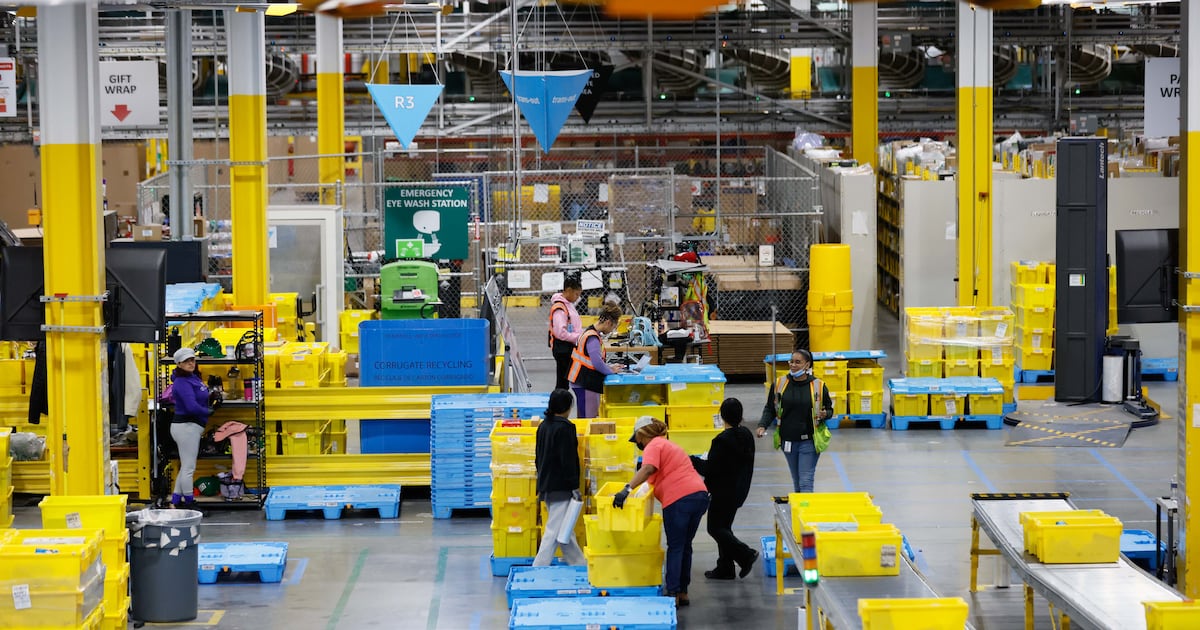“Atlanta does what Atlanta always does, which is to overbuild,” CBRE Executive Vice President Blaine Kelley said. “It’s not a calamity, but we are overbuilt, and the market is feeling pretty soft right now.”
The 2020 COVID-19 shutdown roiled supply chains and generated unprecedented demand for more warehouses and shipping centers. By 2022, what would have been a typical year’s worth of warehouse space was starting construction every three months, and more projects kept increasing the backlog.
“We had so much construction deliver in 2023 and 2024 that we’re still kind of chipping away at that,” said Lisa Pittman, the logistics and industrial services group leader for real estate service firm Cushman & Wakefield.
ExploreWhy has a Georgia agency paused reviews of new data center proposals?
Atlanta’s nation-leading data center market, a niche segment of industrial space designed to house computer servers, has similarly seen its construction figures balloon over the past two years. But while demand for computer storage space has yet to skip a beat, the same can’t be said for logistics warehouses and rentable manufacturing space.
The region’s industrial vacancy rate has increased to 8.6%, more than double what it was in 2022, according to CBRE. The uptick is predominantly credited to a lack of large leases inked this year. No industrial lease larger than 500,000 square feet has been finalized in 2025.
That trend has hurt new buildings trying to attract large tenants. At least eight warehouses delivered to market since 2023 in metro Atlanta are completely vacant, according to a survey by CBRE.
“No one in the leasing business likes to talk about a vacant anniversary,” Kelley said. “But there’s some anniversaries out there.”
Cracking the whip
Real estate experts said Atlanta’s industrial market is currently a classic example of the “bullwhip effect.”
Named after the unwieldy whips used to manage livestock, it’s an economic principle used to explain how small changes in consumer demand can ripple through supply chains and cause overcorrections. Kelley said it’s a phenomenon all Americans witnessed firsthand during the pandemic after grocery store shelves and used car lots were empty.
“Five years ago, we couldn’t find anything at all. Toilet paper, cars, semiconductors, T-shirts,” he said. “Then we had too much. That oscillation really shows up in real estate as well.”
Credit: Jason Getz / Jason.Getz@ajc.com
Credit: Jason Getz / Jason.Getz@ajc.com
ExploreSharks ‘smell blood’ in Atlanta’s office market as distress mounts
Metro Atlanta’s steady population growth and influx of corporate investment insulated its industrial market from larger headwinds that have shaken other sectors’ growth trajectory. The region’s office market was fundamentally upended by the pandemic popularizing remote and hybrid work schedules, which prompted record-setting vacancies and some notable foreclosures.
The industrial market doesn’t face the same existential demand threat nor the same pervasive loan distress, experts said. Several companies and real estate investment trusts have pumped money into industrial projects or acquiring warehouse portfolios in recent months.
Philadelphia-based Alterra IOS closed a $343.6 million loan last week to acquire more than 350 industrial sites across the country, including in Atlanta. Canadian private equity firm Brookfield in July closed a $438 million deal to buy a 53-property portfolio filled with industrial warehouses, including some in Atlanta.
Andy Smith, a Brookfield executive, said in a news release that industrial properties still present a strong investment opportunity despite “increased market uncertainty and rising replacement costs,” referencing how inflation has ballooned the cost of new construction.
ExploreGeorgia job count surpasses 5 million for first time ever‘Willing to recommit’
Leasing activity, while soft given the amount of new space that’s finished construction, has preserved some momentum.
Audrey Giguere, research manager for Cushman & Wakefield, said industrial lease signings increased more than 5% in the second quarter compared with the first quarter this year. Lease renewals jumped 25%.
“(That) signals some confidence in the market with people being willing to recommit to their spaces in Atlanta,” she said.
The amount of space available for sublease, while much higher than a few years ago, has remained fairly steady since late 2023. Real estate experts say the sublease market is a key indicator for measuring whether tenants are properly judging how much space they need.
Despite the handful of empty new spaces, warehouses built after 2020 are outperforming their peers at a significant rate, mirroring the flight to quality seen in the office sector. It has Pittman optimistic those blocks of vacant space will begin to fill, and it might not take too long given the amount of new construction is slamming to a halt.
“I think the window is closing rapidly,” she said. “The market is going to shift quicker than (tenants) would like if they haven’t taken action prior to the next 60 days.”
